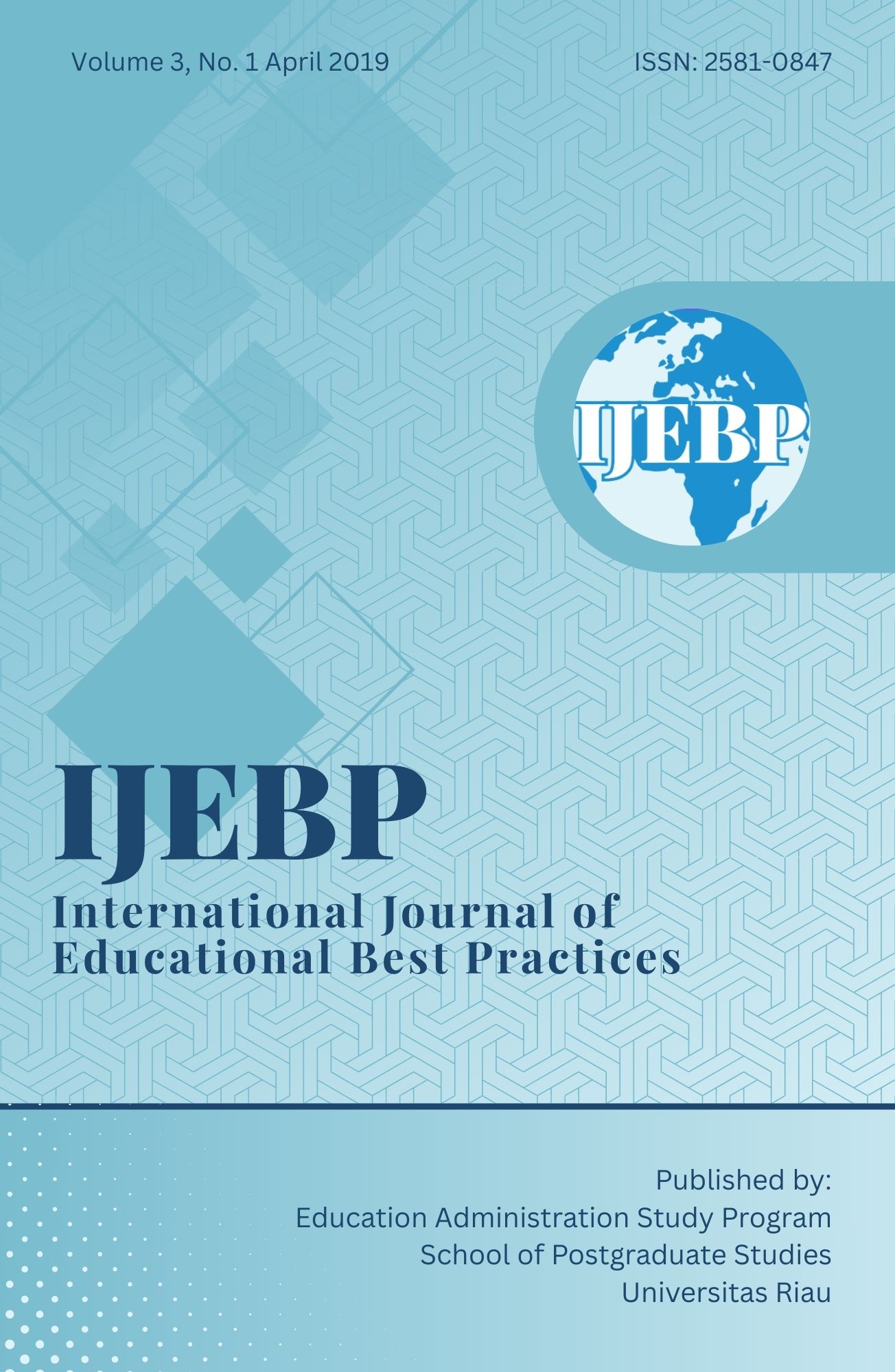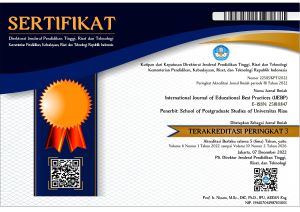RECTIFYING THE TEACHING OF INTENSIVE READING THROUGH METACOGNITIVE STRATEGY: A CASE IN AN INDONESIAN JUNIOR HIGH SCHOOL
DOI:
https://doi.org/10.31258/ijebp.3.1.1-14Keywords:
intensive reading, reading comprehension, grammar translation method, language learning theories, metacognitive strategyAbstract
Since intensive reading has long been a part of curriculum core in Indonesia and is the main and only English skill tested in the National Examination, many teaching procedures usually focus on ways to assist students succeed in the examination. Therefore, there is a tendency for teachers to simply equip students with texts and help to make sense of the texts by translation so that enabling students to answer the given questions. While it may be helpful to some extent, there is a claim that this mode of teaching is (1) less accurate as it is deemed as practising reading, not teaching students how to read and (2) less effective for a mere texts’ translation affords insufficient support for profound understanding and autonomy in learning to occur. This paper thus addresses this teaching issue happened specifically in a junior high school in Indonesia, where teachers still use translation, i.e. Grammar Translation Method, in teaching reading with a lot of practices and less strategy of how to read. Theoretical foundations of intensive reading and theories of language learning are critically discussed, which then lead to suggest the metacognitive strategy as a potential solution to resolve the issue. This paper hence could (a) enhance our understanding on intensive reading and its relation to language learning theories and (b) offer an insight of possible solution to cope other cases similar to the one presented in this paper.
References
Ahmadi, M.R., Ismail, H.N., & Abdullah M.K.K. (2013). The Importance of Metacognitive Reading Strategy Awareness in Reading Comprehension. English Language Teaching. 6(10), 235–244.
Aziez, Furqanul. (2011). Examining the Vocabulary Levels of Indonesia’s English National Examination Texts. Asian EFL Journal. 51(2011), 16–29.
Basic Data of Primary and Secondary Education. (2018). Basic Data of Primary and Secondary Education, Directorate General of Primary and Secondary Education, Ministry of Education and Culture. [Online]. Accessed 18 November 2018]. Available from: http://dapo.dikdasmen.kemdikbud.go.id/
Cahyono, Bambang Budi &Widiati, Utami. (2006). The Teaching of EFL Reading in the Indonesian Context: The State of the Art. TEFLIN Journal. 17(1), 36–58.
Cairney, Trevor H. (1990). Teaching reading comprehension: Meaning makers at work. Milton Keynes: Open University Press.
Chakici, Dilek. (2017). An Overview of Metacognitive Strategies in Reading Comprehension Skill. International Journal of Social Sciences, I (57), 67-82.
Channa, M.A., Nordin, Z.S., Siming, I.A., Chandio, A.A. & Koondher, M.A. (2015). Developing Reading Comprehension through metacognitive Strategies: A Review of Previous Studies. English Language Teaching, 8(8), 181-186.
Cubukcu, Feryal. (2008). Enhancing vocabulary development and reading comprehension through metacognitive strategies. Issues in Educational Research, 18(1), 1-11.
Day, Richard R & Park, Jeong-suk. (2005). Developing Reading Comprehension Question. Reading in a Foreign Language. 17(1), 60–73.
Dole, et.al. (1991). Moving from the Old to the New: Research on Reading Comprehension Instruction. Review of Education Research. 61(2), 239–264.
Effendy, Taufiq & Suyudi, Ichwan. (2017). The Impacts of English National Examination in Indonesia. Advances in Social Science, Education and Humanities Research (ASSEHR). 82(2017), 236–239.
Erfanpour, Mohammad Ali. (2013). The Effect of Extensive and Intensive Reading Strategies on Reading Comprehension: A Case of Iranian High School Students. English for Specific Purpose World. 41(14), 1–21.
Farida, Farida. [no date]. Improving Teachers’ Professionalism. [online]. [Accessed 10 December 2018] Available from: http://mebermutu.org/.
Fitrisia, D., Tan, K-E., Yusuf, Y.Q. (2015). Investigating Metacognitive Awareness of Reading Strategies to Strengthen Students’ Performance in Reading Comprehension. Asia Pacific Journal of Educators and Education, 30(2015), 15-30.
Flavell, J.H. (1979). Metacognition and Cognitive Monitoring: A New Area of Cognitive Developmental Inquiry. American Psychologist, 34(10), 906-911.
Grabe, William. (2009). Reading in a second language: moving from theory to practice. Cambridge: Cambridge University Press.
Griffith, Priscilla L. & Ruan, Jiening. (2005). What is Metacognition and What Should Be Its Role in Literacy Instruction. In: Israel et.al. Metacognition in Literacy Learning. New Jersey: Lawrence Erlbaum Associates, 3–18.
Hafiz, F. M. & Tudor, Ian. (1989). Extensive reading and the development of language skills. ELT Journal. 43(1), 4–13.
Hamra, Arifuddin & Syatriana, Eny. (2010). Developing a Model of Teaching Reading Comprehension for EFL Students. TEFLIN Journal. 21(1), 27– 40.
Hedge, T. (1985). Using Readers in Language Teaching. London: Modern English Publications.
Jubran, Sereen Mousa. (2016). The Effect of the Social Constructivist Approach on Teaching Reading to Jordanian University Students. US-China Education Review A. 6(5), 310-315.
Kolic-vehovec, Svjetlana. (2006). Metacognitive Strategies and Reading Comprehension in Elementary-School Students. European Journal of Psychology of Education. 21(4), 439-451.
Lantolf, James P. (2000). Sociocultural Theory and Second Language Learning. Oxford: Oxford University Press.
Lightbown, Patsy M. & Spada, Nina. (2013). How Languages are Learned. 4th ed. Oxford: Oxford University Press.
Macalister, J. (2011). Today’s teaching, tomorrow’s text: exploring the teaching of reading. ELT Journal. 65(2), 161–169.
Macalister, John. (2014). Teaching reading: Research into practice. Language Teaching. 47(3), 387–397.
Mbato, Concilianus Laos. (2013). Facilitating EFL learners’ self-regulation in reading: implementing a metacognitive approach in an Indonesian higher education context. EdD thesis, Southern Cross University, Lismore, NSW.
McLaughlin, Maureen. (2012). Reading Comprehension: What Every Teacher Needs to Know. The Reading Teacher. 65(7), 432–440.
Morris, J.D. (1972). Intensive Reading. ELT Journal. 27(1), 38–47.
Nash-Ditzel, Susan. (2010). Metacognitive Reading Strategy Can Improve Self-Regulation. Journal of College Reading and Learning. 40(2), 45–63.
Nation, I.S.P. (2009). Teaching ESL/EFL Reading and Writing. New York; London: Routledge.
Nuttal, Christine. (1996). Teaching Reading Skills in a foreign language. London: Heinemann Educational.
Orasanu, Judith. (1985). Reading comprehension: from research to practice. Hillsdale, N.J.; London: Erlbaum.
Patel, M.F., & Jain, Praveen M. (2008). English Language Teaching: methods, tools, and techniques. Jaipur: Sunrise publishers and distributors.
Phakiti, Aek. (2003). A Closer Look at the Relationship of Cognitive and Metacognitive Strategy Use to EFL Reading Achievement Test. Language Testing, 20(1), 26-56.
Randi, Judi, Grigokenko, Elena.L, & Sternberg, Robert J. (2005). Revisiting Definition of Reading Comprehension: Just What Is Reading Comprehension Anyway? In: Israel et.al. Metacognition in Literacy Learning. New Jersey: Lawrence Erlbaum Associates, 19–39.
Richards, J.C., & Smith, R. (2002). Longman dictionary of language teaching and applied linguistics. Malaysia: Pearson Education.
Richards, Jack C. (1997). From reader to reading teacher: issues and strategies for second language classrooms. Cambridge; New York: Cambridge University Press.
Sarjan, Nurmadia & Mardiana. (2017). An Analysis on the English Teacher Strategies in Teaching Reading Comprehension SMP 1 of Wonomulyo. ETERNAL (English, Teaching, Learning, and Research Journal), 3(2), 151-160.
Sugianto, Aris. (2016). An analysis of English national final examination for junior high school in terms of validity and reliability. Journal of English as a Foreign Language. 6(1), 29–40.
Suryanto, Suryanto. (2017). An Investigation on English Reading Comprehension Problems in Indonesian Cultural Contexts. The 1st International Conference on Education, Science, Art and Technology (the 1st ICESAT), 22–23 July 2017, Makassar. [Online]. Makassar: -, pp.200–205. [Accessed 18 November 2018]. Available from: http://ojs.unm.ac.id/icesat/article/view/3738.
Urquhart, Sandy & Weir, Cyril. (1998). Reading in a second language: process, product, and practice. London: Longman.
Vygotsky, Lev. (1986). Thought and Language. Cambridge, Massachusetts: The MIT Press.
Z.A., Maulizan. (2015). Teaching Reading Comprehension to EFL Junior High School Students. English Education Journal (EEJ). 6(3), 370–382.





